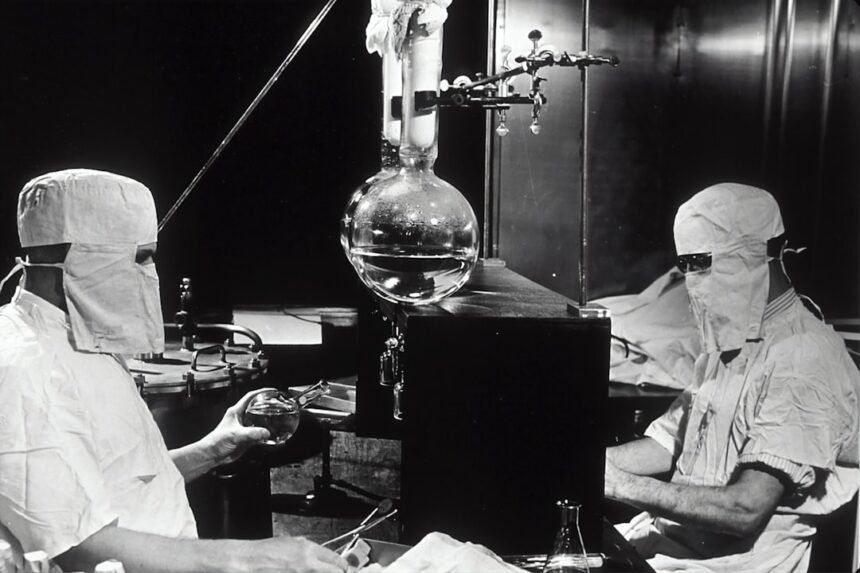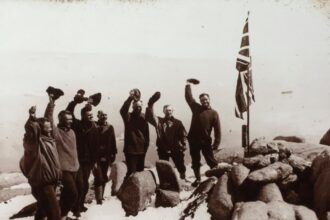In the aftermath of World War II, the geopolitical landscape of Europe underwent a dramatic transformation. Among the most controversial developments was the recruitment of Nazi scientists by the Soviet Union. As the war concluded, the USSR found itself in a race against time to bolster its scientific and technological capabilities, particularly in the fields of rocketry, nuclear physics, and medicine.
The expertise of these former Nazi scientists, many of whom had been instrumental in the development of advanced technologies during the war, became a valuable asset for the Soviet regime. This article delves into the complex dynamics surrounding the recruitment and integration of these scientists into Soviet society, exploring their contributions, ethical implications, and the lasting legacy of their work. The decision to employ Nazi scientists was not without its moral quandaries.
The Soviet government faced a dilemma: while these individuals had been associated with a regime responsible for horrific atrocities, their knowledge and skills were deemed essential for national security and technological advancement. This paradox set the stage for a unique chapter in history, where the intersection of science and ideology would yield both remarkable achievements and profound ethical questions. As the Cold War began to take shape, the implications of this collaboration would resonate far beyond the borders of the USSR, influencing global scientific discourse and international relations.
Key Takeaways
- Nazi scientists were recruited by the Soviet Union after World War II to work on various scientific projects.
- The role of Nazi scientists in post-war experiments in the USSR included research in fields such as rocketry, medicine, and biological warfare.
- Experiments conducted by Nazi scientists in the USSR ranged from human experimentation to the development of advanced weaponry.
- The ethical implications of Nazi scientists’ involvement in post-war experiments in the USSR raised concerns about the use of unethical methods and the impact on human rights.
- The impact of Nazi scientists’ work in the USSR on scientific advancements was significant, leading to advancements in technology and military capabilities.
The recruitment of Nazi scientists by the Soviet Union
The recruitment process for Nazi scientists by the Soviet Union was both systematic and strategic. In the immediate aftermath of World War II, as Allied forces occupied Germany, Soviet intelligence agencies began to identify key figures within the German scientific community. The USSR sought out individuals who had made significant contributions to military technology, particularly in areas such as aeronautics and nuclear research.
The allure of safety and opportunity in a new regime prompted many scientists to consider relocation to the Soviet Union, where they could continue their work under a different banner. The Soviet government employed various tactics to entice these scientists.
Additionally, some scientists were coerced into cooperation through threats or imprisonment. The Soviet Union’s approach was multifaceted; it combined elements of persuasion with an underlying current of intimidation. This dual strategy proved effective in securing the expertise needed to advance Soviet scientific endeavors, even as it raised questions about the ethical implications of employing individuals with such controversial pasts.
The role of Nazi scientists in post-war experiments in the USSR

Once integrated into Soviet research institutions, Nazi scientists played pivotal roles in various post-war experiments. Their expertise was particularly sought after in fields that had direct implications for military and space technology. For instance, many former German rocket scientists contributed significantly to the Soviet space program, which would eventually lead to landmark achievements such as launching Sputnik and sending Yuri Gagarin into space.
These contributions were not merely technical; they also shaped the trajectory of Soviet ambitions during the Cold War. Moreover, Nazi scientists were involved in medical research that often crossed ethical boundaries. Their previous work during the war had included human experimentation under horrific conditions, and this experience was repurposed in the USSR for various medical advancements.
While some of their research led to genuine breakthroughs, it was often conducted without regard for ethical standards or human rights. This duality—of scientific progress shadowed by moral compromise—characterized much of their work in the Soviet Union.
Experiments conducted by Nazi scientists in the USSR
| Experiment | Description | Outcome |
|---|---|---|
| Hypothermia | Exposure to extreme cold to study effects on the human body | Many subjects died from exposure |
| Infectious diseases | Testing of biological agents on prisoners | High mortality rates among subjects |
| Chemical weapons | Exposure to toxic gases and substances | Severe injuries and fatalities |
| Surgical procedures | Unethical surgeries performed without anesthesia | Many subjects suffered permanent damage or died |
The experiments conducted by Nazi scientists in the USSR spanned a wide range of disciplines, from aerospace engineering to medicine. In aerospace research, former German engineers applied their knowledge of rocket propulsion and aerodynamics to develop advanced missile systems that would later become integral to Soviet military capabilities. Their work laid the groundwork for innovations that would propel the USSR into a leading position in the space race.
In the realm of medicine, however, the legacy of Nazi experimentation took on a more troubling dimension. Many former Nazi doctors were involved in unethical medical trials that often disregarded informed consent and human dignity. These experiments included testing new drugs and treatments on vulnerable populations without proper oversight or ethical considerations.
While some findings contributed to advancements in medical science, they were often overshadowed by the dark history from which they emerged. The juxtaposition of scientific progress against a backdrop of moral failure created a complex narrative that continues to provoke debate among historians and ethicists alike.
Ethical implications of Nazi scientists’ involvement in post-war experiments
The ethical implications surrounding the involvement of Nazi scientists in post-war experiments are profound and multifaceted. On one hand, their contributions led to significant advancements in various fields; on the other hand, these advancements were often achieved at an unacceptable moral cost. The use of individuals who had previously engaged in heinous acts raised questions about complicity and accountability within scientific communities.
The very act of employing these scientists was seen by some as an endorsement of their past actions, leading to a troubling moral ambiguity. Furthermore, the lack of transparency regarding their work compounded these ethical dilemmas. Many experiments conducted under their guidance were shrouded in secrecy, making it difficult for outside observers to assess their validity or ethical standing.
This opacity not only hindered public trust in scientific endeavors but also sparked debates about the responsibilities of scientists and governments in ensuring ethical standards are upheld. The legacy of these ethical challenges continues to resonate today as societies grapple with similar dilemmas surrounding scientific research and its implications.
The impact of Nazi scientists’ work in the USSR on scientific advancements

The impact of Nazi scientists’ work in the USSR on scientific advancements was both significant and far-reaching. Their expertise facilitated rapid progress in several key areas, particularly in rocketry and nuclear physics. The knowledge they brought from Germany allowed Soviet researchers to leapfrog over years of development that might have otherwise taken decades to achieve independently.
This acceleration not only bolstered national security but also positioned the USSR as a formidable player on the global stage during the Cold War. In addition to military applications, their contributions extended into civilian sectors as well. Innovations derived from their work influenced various industries, including aerospace engineering and medicine.
The technological advancements achieved during this period laid foundational stones for future developments that would shape modern science and technology. However, this progress came with an inherent tension; it served as a reminder that significant scientific achievements could emerge from morally questionable practices.
The legacy of Nazi scientists’ work in the USSR
The legacy of Nazi scientists’ work in the USSR is complex and multifaceted, marked by both remarkable achievements and profound ethical questions. On one hand, their contributions played a crucial role in establishing Soviet dominance in various scientific fields, particularly during the early years of the Cold War. The successful launch of satellites and manned space missions can be traced back to their expertise, which fundamentally altered humanity’s relationship with space exploration.
Conversely, this legacy is also tainted by the moral implications of their pasts. The employment of individuals who had participated in or condoned atrocities raises uncomfortable questions about accountability within scientific communities. As historians continue to examine this period, they grapple with how to reconcile these achievements with the ethical compromises that accompanied them.
The legacy left behind serves as a cautionary tale about the intersection of science and morality—a reminder that progress should never come at the expense of human dignity.
The relationship between the Soviet government and Nazi scientists
The relationship between the Soviet government and Nazi scientists was characterized by pragmatism and mutual benefit. For the Soviet regime, these scientists represented an invaluable resource that could be harnessed for national advancement. In turn, many former Nazis found themselves navigating a new political landscape where their skills were not only welcomed but actively sought after.
This relationship was often transactional; while scientists provided expertise, they also sought security and stability within a regime that offered them a second chance. However, this partnership was not without its tensions. Many former Nazis lived under constant scrutiny from Soviet authorities, who were wary of potential dissent or loyalty to their previous regime.
This atmosphere created an uneasy coexistence where trust was limited, yet necessity drove collaboration. As time progressed, some scientists adapted to their new environment while others struggled with their pasts—creating a complex dynamic that reflected broader themes of redemption and complicity.
The secrecy surrounding Nazi scientists’ work in the USSR
Secrecy surrounded much of the work conducted by Nazi scientists in the USSR, reflecting both governmental priorities and ethical concerns. The Soviet regime operated under a veil of confidentiality regarding military and scientific advancements; this secrecy was further compounded by the controversial backgrounds of many involved. As a result, much of their research remained classified for decades, limiting public access to information about both methodologies and outcomes.
This lack of transparency had significant implications for public trust in science and governance. Citizens were often left unaware of how their government was utilizing knowledge derived from individuals with such troubling histories.
The influence of Nazi ideology on post-war experiments in the USSR
The influence of Nazi ideology on post-war experiments in the USSR is a contentious topic that invites scrutiny from historians and ethicists alike. While many former Nazi scientists distanced themselves from their past beliefs upon relocating to the USSR, remnants of those ideologies occasionally surfaced within their work—particularly regarding notions of racial superiority or utilitarianism in medical research practices. This ideological undercurrent manifested itself most starkly in medical experiments that prioritized results over ethical considerations for human subjects.
Although some researchers may have sought to distance themselves from their pasts, echoes of Nazi ideology lingered within certain methodologies employed during experiments conducted under Soviet auspices. This intersection raises critical questions about how ideologies can shape scientific practices—even when those ideologies are ostensibly rejected by individuals who once espoused them.
The eventual fate of Nazi scientists in the USSR
The eventual fate of Nazi scientists in the USSR varied widely depending on individual circumstances and changing political climates over time. Some successfully integrated into Soviet society, contributing significantly to scientific advancements while enjoying relative stability within their new roles. Others faced challenges stemming from lingering suspicions about their pasts or ideological conflicts with Soviet authorities.
As political tides shifted throughout subsequent decades—particularly during periods marked by increased scrutiny or purges—some former Nazis found themselves at risk once again. A few faced arrest or exile as suspicions resurfaced regarding their loyalties or past actions during World War
During the tumultuous years following World War II, the geopolitical landscape was marked by a fierce competition between the United States and the Soviet Union, both of whom sought to harness the expertise of former Nazi scientists to bolster their technological and military capabilities. While much has been written about Operation Paperclip and the integration of these scientists into American projects, the Soviet Union also engaged in similar efforts, albeit with less publicized outcomes. An intriguing article that delves into the Soviet Union’s recruitment and utilization of Nazi scientists can be found on the In The War Room website. For a deeper understanding of this complex historical narrative, you can read more about it by visiting this link.
WATCH THIS! 🪖How Stolen Nazis Built Cold War Power
FAQs
What were the Nazi scientists doing in the USSR?
During and after World War II, the Soviet Union recruited German scientists, engineers, and technicians, including former members of the Nazi party, to work on various projects, such as rocketry, aviation, and other technological advancements.
Why did the USSR recruit Nazi scientists?
The USSR recruited Nazi scientists in an effort to gain access to their expertise and knowledge in various fields, particularly in the development of advanced military technology and scientific research.
What were some of the projects the Nazi scientists worked on in the USSR?
Nazi scientists in the USSR worked on projects related to rocketry, missile development, aviation, and other military and scientific research initiatives. One of the most notable projects was the development of the Soviet space program, which benefited from the expertise of former Nazi scientists.
What impact did the Nazi scientists have on the USSR’s technological advancements?
The Nazi scientists brought valuable knowledge and expertise to the USSR, which significantly contributed to the country’s technological advancements, particularly in the fields of rocketry, aviation, and space exploration. Their contributions played a crucial role in shaping the Soviet Union’s scientific and military capabilities during the Cold War era.
Did the recruitment of Nazi scientists by the USSR have any ethical implications?
The recruitment of Nazi scientists by the USSR raised ethical concerns, as many of these individuals had been involved in war crimes and atrocities during World War II. However, the Soviet Union prioritized technological and scientific advancements, leading to the employment of these scientists despite their controversial pasts.




